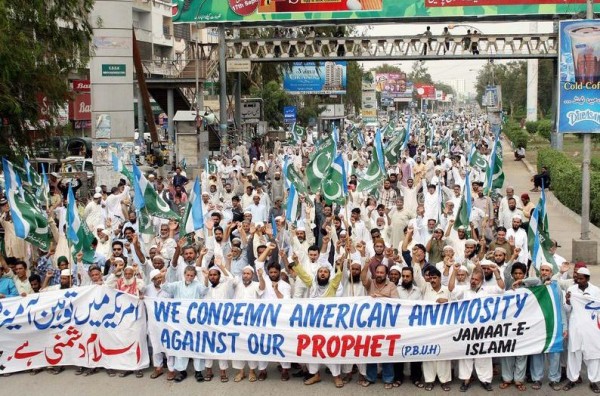After the violent protests in Egypt and Libya [1] which left the United States (US) Ambassador to Libya dead, embassies across the populous Muslim nations have taken strict security measures to prevent further damage. The trouble started when a 13 minute video of an anti-Islam movie [2] was released to a social media website.
Violence broke out in the Egyptian city of Cairo and soon spread to the Libyan city Benghazi sparking a chain reaction in Middle East as well as other countries of South Asia. The country of Lebanon saw its share of trouble [3] after protesters set fire to KFC and Hardees restaurants in Tripoli. The German and British embassies in Sudan [4] also came under attack while an American school in Tunisia was also targeted.
Closer to home, nearly 10,000 protesters took to streets in the Bangladeshi capital of Dhaka [5], burning the American and Israeli flag along the way. Muslims in neighbouring India too attacked [6] the US embassy and pelted the building with stones.
Pakistan reacts
In the wake of these protests, diplomatic agencies across Pakistan tightened security [7]. The US embassy beefed up its security for possible threats against it.
A rally held by Majlis Wahdatul Muslameen [8] started from the G-5 Imam Bargah in Islamabad and marched to the US embassy on Friday, 14 September, 2012, in protest. Strict security measures kept things under control. Demanding a public apology from US for the film, the protesters also called for its immediate removal from social networking websites.
In Lahore, hundreds of protesters [9] came out on streets after Friday prayers and burnt American flags. Hafiz Saeed, the leader of a banned militant organisation Jamaat ud Dawa also participated in the rally calling this an US conspiracy.
The financial hub of Pakistan, Karachi – still recovering from the tragic factory fire [10] that killed hundreds of workers – also witnessed rallies that were organised by Jamaat-e-Islami. The members of the protesting group called for a ban on the movie as well threatened to attack the US embassy in Islamabad if the government failed to take notice.
 [11]
[11]Activists of Jamat-e-Islami chant slogans against the anti-Islam movie released in the USA, Karachi, Pakistan. Image by Owais Aslam Ali. Copyright Demotix (14/9/2012)
In 2006, after a Danish newspaper printed cartoons of the Prophet Muhammad causing widespread controversy, nearly 70,000 people came out on streets [12] of Peshawar, generating state-wide havoc. A powerful explosion took place [13] near the Danish embassy in Islamabad killing six and wounding dozens.
Angry, but peaceful
The protests held across the country on this occasion, though angry, were peaceful and there were no reported aggravated acts of violence.
@CMShehbaz [14]: Peaceful demonstrations and rallies were held against anti-Islam US film throughout Pak today.
Scores of people on Twitter shared their dismay at the tense situation:
@TahaSSiddiqui [15]: American flag burning ceremony in Islamabad, 500 meters from Diplomatic Enclave where US embassy is based.
@Ali_Abbas_Zaidi [16]: minor boy armed with guns, poster saying “Who has disgraced my Prophet?”. Prophet would want you to pick a pen instead.
@HaroonRiaz [17]: How simple it is to stir a riot in Muslim countries for just about anyone living in a Western country. I find it fascinating.
@Zoya_Altaf [18]: So it seems like #protests all over the country… #pakistan
@Manticore73 [19]: Was expecting an industrial-strength rant from local mosque today – but nothing. How is it elsewhere?
@ImtiazTyabAJE [20]: Only about 20-30 actual protesters. Rest appear to be curious after-prayer onlookers. #pakistan
@akkhan81 [21]: Islamophobes are successful at turning Islam hate videos into debates about free speech, and Muslims always seem to fail that test.
As acts of violence continue across the Muslim world, Google has temporarily restricted access to the infamous video in Libya and Egypt [22]. According to its officials:
Under YouTube’s terms of service, hate speech is speech against individuals, not against groups. Because the video mocks Islam but not Muslim people, it has been allowed to stay on the site in most of the world. [..] However, given the very difficult situation in Libya and Egypt we have temporarily restricted access in both countries.
This was an unprecedented move on the part of Google, Jillian York at Global Voices Advocacy has details [23].